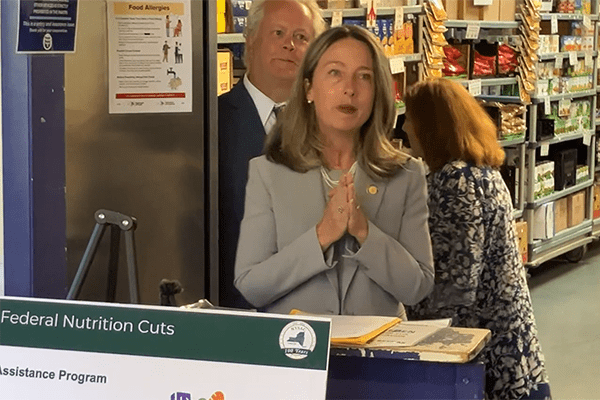|
RCBJ-Audible (Listen For Free)
|
Diane Serratore, Alongside Four Legislators, Call On State And Federal Officials To Take Action to Head Off SNAP Reductions; No State or Congressional Representatives Were Present
By Tina Traster
Food insecurity is too often a hidden scourge but not to those who go hungry.
As it is, 12 percent of Rockland households receive Supplemental Nutrition Assistance Program (SNAP) benefits that can be used like cash to purchase food, according to the Feeding America study in 2023, the latest available data.
Four county legislators, all Democrats, on Wednesday, stood shoulder-to-shoulder with the CEO of People to People, Diane Serratore, to sound the alarms on anticipated impacts of federal cuts to food assistance programs in Rockland County.
“Make no mistake, this federal government is blowing a hole in Rockland’s budget and hurting thousands of families who rely on SNAP to put food on the table,” said County Legislator Beth Davidson, at a press conference at People to People in West Nyack. “SNAP cuts will leave thousands of Rockland residents, including seniors, children, and families without enough to eat.”
Legislators and Serratore aimed to draw attention to anticipated funding cuts in the “One Big Beautiful Bill Act” passed by Congress and signed by President Trump in July. Officials are grappling with uncertainties swirling around the legislation, which is set to begin in October 2026, including how many will be impacted, how new work requirements will change the administering of food benefits, and how the county and state’s burden will increase to make up the difference in federal shortfalls.
Officials warned how the One Big Beautiful Bill Act will alter the landscape and adversely impact Rockland County.
Under the current law, the federal government pays 50 percent of the costs of administering SNAP. The new law drops the federal share to 25 percent, leaving the state and counties to pay 75 percent of the administrative costs – a 50 percent increase. Only a handful of states, including New York, New Jersey, Virginia and others, require counties to pay administrative costs.
According to a report by the New York State Association of Counties (NYSAC), the administrative impact on Rockland County will be nearly $2.2 million annually. Administrative costs are likely to rise because the OBBBA adds significant administrative functions, verifications, and tracking requirements.
“The so-called OBBBA imposes onerous new filing and certification requirements of Rockland’s Department of Social Services, which means we’ll either have to hire additional staff or risk a backlog and delay in folks getting help, such as food assistance or medical care,” said County Legislator Jesse Malowitz.
The new law also alters the cost sharing formula and “error rate tiers”, both of which adversely affect the county. A SNAP error rate tier refers to a state’s performance on the SNAP payment error rate, which measures how accurately state’s determine eligibility and benefit levels for households. The OBBBA increased penalties for high error rates, with states potentially having to pay a percentage of total SNAP benefits at higher tiers.
NYSAC pegs the Benefit Cost Sharing Impact to Rockland County at $17.9 million. With the increased administrative costs, the combined impact of the two changes exceeds $20 million.
“Cutting the Emergency Food Assistance Program and the Supplemental Nutritional Program is unconscionable. I urge the Federal Government to restore these vital programs so we can ensure nobody goes hungry. I will work with my fellow legislators to put pressure on our federal officials to rectify this poor decision. We’re better than this,” said County Legislator Paul Cleary.
“The potential impact of these SNAP cuts will be nothing short of catastrophic for families in Rockland and across New York State, said County Executive Ed Day. “Rockland is working hard to finalize our budget responsibly, but we cannot do so without clarity from the State. Shifting these costs to counties could, and likely would, result in drastic local property tax increases.”
County legislators said they are seeking advocacy from state and congressional officials to rectify this anticipated plight. Neither state nor federal officials were present at the press conference, but the county legislators said they wanted to “spread the word” and “advocate” for change. They also made a point of saying that the extra burden placed on Rockland County will undermine the county’s AAA credit rating from Moody’s. The cuts, said Davidson, will put “the county’s financial stability at risk after more than a decade of hard work.”
“By shifting the costs of SNAP onto New York State and Rockland County, the Trump administration is forcing county government to do more with less, at a time when food insecurity in Rockland is going up – not down. People in our community will go hungry, and I can’t stand quietly by and let that happen,” said County Legislator Dana Stilley.
The Supplemental Nutrition Assistance Program (SNAP) issues electronic benefits that can be used like cash to purchase food. SNAP helps low-income working people, senior citizens, the disabled and others feed their families. Eligibility and benefit levels are based on household size, income and other factors.
County legislators, along with Serratore, are hoping Rockland County will take threats to the social safety net into account as they begin to formulate their annual budget beginning in October. The Legislature on Wednesday signed a proclamation declaring September “Hunger Action Month.”
“We can barely do what we do with what we have,” said Serratore.
Feeding Rockland’s food insecure remained relatively stable between 2018 and 2022. But the numbers rose more dramatically from 48,520 individuals in 2022 to 57,488 in 2023. In 2024, the number further spiked to 72,378, and from January to August of 2025, 41,967 were served – with four more months left to the calendar year.













